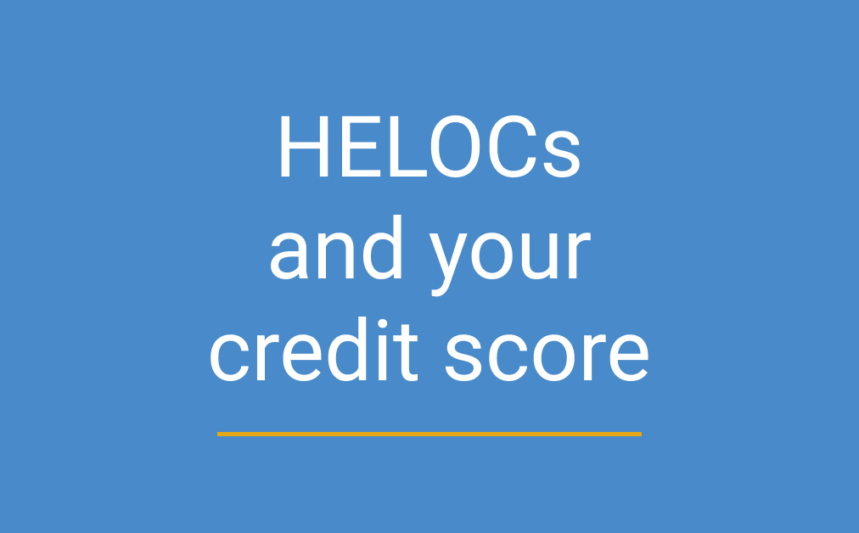Homeownership comes with many benefits. A Home Equity Line of Credit, or HELOC, can be one of them! If you want to open a line of credit, need funds for a renovation project, or have any other significant ongoing or upcoming expenses, a HELOC can be both helpful and sensible.
When making any financial decision, you should start by considering the potential effect on your financial health. Your experts at Liberty Bay are here to help you understand HELOCs better by taking a look at how a HELOC could affect your credit score.
Difference between HELOC and home equity loans
Since HELOCs and Home Equity Loans share some similarities, they can be easily confused. Let us start by looking at why these are not interchangeable!
Both allow you to tap into your home’s equity. If you own your home fully, your home’s equity is its market value. If you still owe part of your mortgage, subtract the amount you owe from the market value to find your home’s equity.
A home equity loan is a one-time loan and works like a second mortgage. It usually has higher interest rates because it comes with the stability of a fixed term and equal monthly payments – it’s easier to plan ahead because you know exactly how much you must pay each month.
In contrast, a HELOC works sort of like a credit card: it’s a revolving credit line with a maximum credit limit. You can draw from your HELOC to finance projects, make payments, or withdraw funds as needed until you reach the limit. As you use your HELOC, you’ll receive monthly bills with varying required payments.
Using your HELOC correctly can help your credit score. However, like with all credit, if you’re not responsible, a HELOC can potentially be damaging to your credit score.
HELOC credit score benefits
Using your HELOC correctly can boost your credit score. Here are some of the benefits your HELOC can have for your credit score:
- Increase your available credit. You don’t need excellent credit to qualify for a HELOC, and there is no major impact on your score upon getting approved. A higher limit can help boost your credit by lowering your overall debt-to-credit ratio: how much credit you have compared to how much you’re using.
- Improve your payment history. Your payment history is the most critical factor in your credit score, so making timely payments on your HELOC can boost your credit score.
- Keep interest payments low. HELOCs often have lower introductory rates than most credit cards, which can make it easier for you to pay back what you use.
- Stay in control with easy access. You’re in full control of when funds are withdrawn from your HELOC, and therefore when you need to start making payments. This level of control can help you pay on time, which keeps your credit score healthy.
Your HELOC can serve as a flexible, open-source of funds for emergencies or future plans. Also, your interest payments may be tax-deductible up to $100,000!* These benefits can improve your financial health and make it easier for you to stay on top of your credit score.
Since HELOCs are convenient and relatively low-cost, many people use them for debt consolidation. Paying off multiple debts through your HELOC can help simplify your finances, but take this with a grain of salt and consider some of the potential drawbacks below.
HELOC credit score drawbacks
While a HELOC has many benefits, you must be careful to use it correctly to avoid some of the ways it could hurt your credit score. Here are some things you should avoid when it comes to your HELOC:
- Don’t use too much of your HELOC without a solid payback plan. Although a higher limit can help boost your credit, using a large portion of your HELOC may increase your debt-to-credit ratio. This may be necessary if you need your HELOC to finance a major expense or project, but make sure you are prepared to pay your debt back responsibly.
- Don’t be tempted by the high credit limit and low-interest rates. Your HELOC’s high credit limit and relatively low-interest rate can make it tempting to overspend. Racking up more debt will lower your credit score as a result.
- Don’t forget to account for variables. Variables can make it hard to predict your monthly payments, which can put you behind on payments and, in turn, lower your credit score. Remember that interest rates can fluctuate and even spike dramatically, and if your credit score or home value change, your lender may reduce your HELOC’s credit limit as well.
- Don’t lose track of your interest-only period. Some HELOCs come with an up-front interest-only period, which can help keep your initial monthly payments low. However, future monthly payments may be dramatically higher. If you lose track and end up missing payments, this can lower your credit score.
In addition to these potential HELOC credit score drawbacks, you should also be aware of two other possible risks: the loss of your home and the ability to obtain additional credit or loans.
With a HELOC, your home is your collateral. If you default on payments, you risk foreclosure – timely payments are crucial to mitigate this risk! Also, if you need to obtain additional credit or another loan, some lenders may view your high credit limit as a liability for the reasons above. Depending on individual lending guidelines, this may make it harder for you to secure other financing options.
What to look for in your HELOC to help protect your credit score
So, with all these pros and cons to consider, how can you best protect your credit score if you decide to open a HELOC?
- Know your terms. Ensure you understand when you’re expected to make payments, especially if those expectations change over time. For example, interest-only periods may look easy to pay off at first, but when the lump sum or “balloon payment” is due at the end of your loan, you may be faced with a challenge.
- Keep your maximum possible interest rate in mind. Your HELOC agreement should state the maximum interest rate you’ll be expected to pay. If the rate spikes and you have to pay the maximum, can you still afford it?
- Use financial calculators. If you’re using your HELOC for debt consolidation or financing a significant expense, use financial calculators to plan and make informed decisions. For example, a debt consolidation calculator can help you figure out if extended repayment terms will actually make you pay more in the long term.
Your Liberty Bay experts understand how important it is for you to have flexible financing options for your life plans and daily needs. Let us help you decide if a HELOC is right for you or work with you to ensure opening a HELOC will help, not hurt, your financial health.
Talk to us about getting flexible financing through a HELOC, or apply online today!
*Consult your tax advisor regarding the deductibility of interest on these loans.


